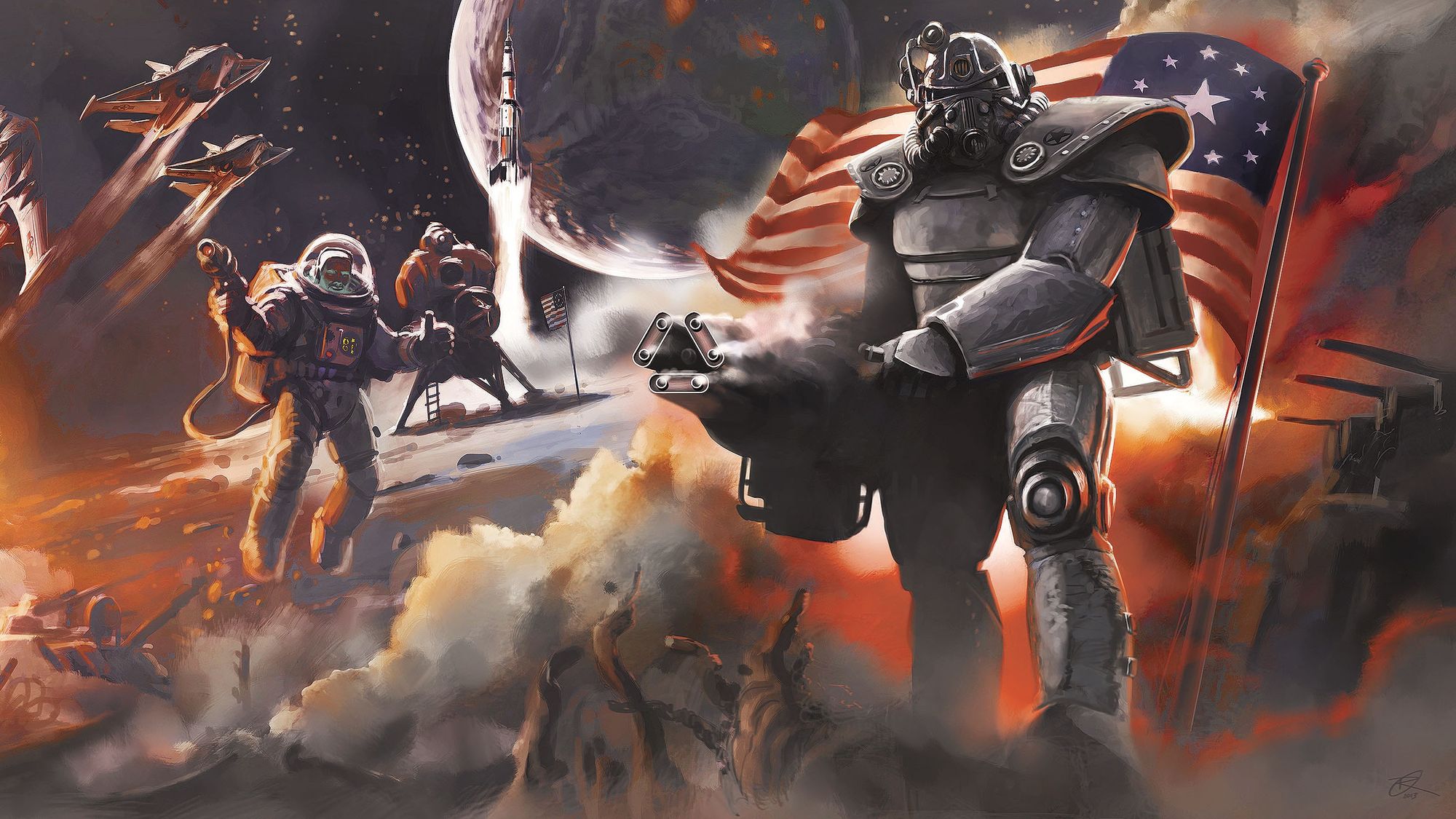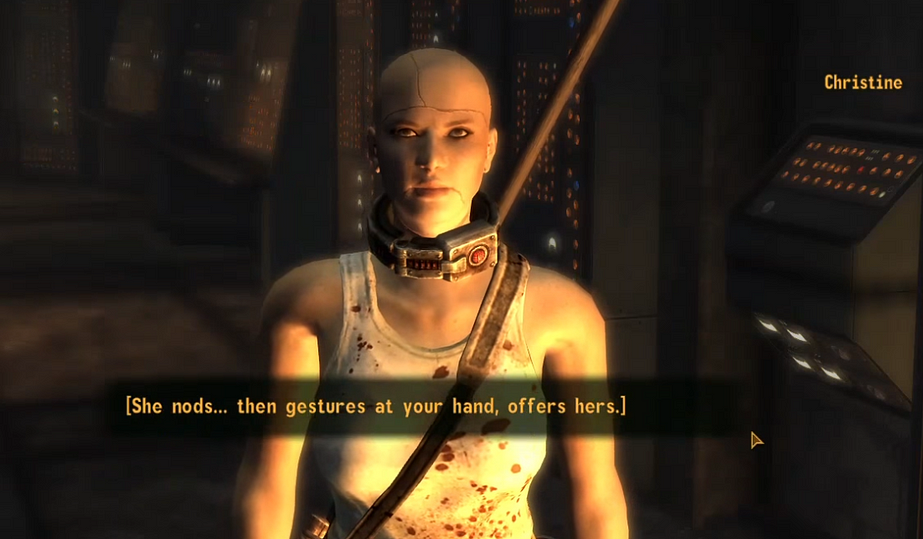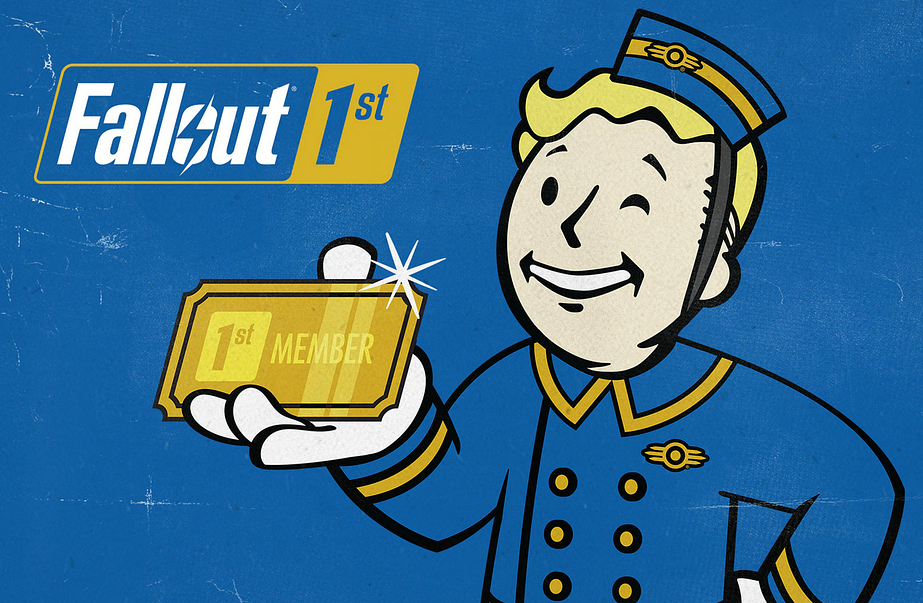Crawl Out Through the Fallout: Where the Fallout Series Lost its Way
When did Fallout stop being a dark satire of 1950s America and become an exemplar of corporate greed?

A Supreme Court Justice entertains upending rights to contraception and same-sex marriage. Children are unsafe even in classrooms. Late-stage capitalism has left many of us jobless and directionless. For many Americans, it feels like the world is ending.
In times like these, I turn to post-apocalyptic stories, perhaps as a reminder that things can always be worse. Among its best offerings is a video game that has launched a wildly successful franchise: Fallout.
Picking up nearly one hundred years after the collapse of an Atomic Age society, where the final conflict for Earth’s dwindling resources resulted in nuclear annihilation, Fallout has players leaving the protection of their Vault to explore the harsh wasteland outside. First released a quarter of a century ago, Fallout’s commentary on American exceptionalism and unchecked capitalism feels as timely as ever.
Since 1997, its five sequels have been (mostly) met with critical acclaim and financial success (Fallout 4, for example, made $750m on launch day). The series is even getting its own Amazon show. But when the IP changed hands between Black Isle Studios and Obsidian Entertainment to Bethesda Softworks (developer of the Doom, Dishonored, and the Elder Scrolls series), the shift from asymmetric RPG to combat-heavy FPS was merely one of the many divisive changes to longtime fans.
The newest title, Fallout 76, was the subject of controversy after controversy after controversy after controversy in the weeks following its disastrous release. Most recently, Kotaku reported on the worrying allegations of former employees: unpaid overtime, long periods of crunch, and gaslighting by management. Aside from the corporate mismanagement, the online-only sandbox was a shocking change from a series known for its story mechanics and characters. The consensus from longtime fans was that the Fallout series had lost its heart.
When did Fallout stop being a dark satire? When did a studio known best for its single-player RPGs move to stand front and center in an ongoing conversation about the ethics of microtransactions?
The Destroyer of Worlds
It’s difficult to imagine the scope of the twin bombings of Nagasaki and Hiroshima, nor the thoroughness of their destruction. Children were burned alive where they stood, families were crushed beneath their ruined city, and the silhouettes of men and women in their final moments were seared into concrete. In a chilling 1945 interview, the “father” of the atomic bomb, J. Robert Oppenheimer, tearfully said, “I am become death, destroyer of worlds.” I imagine that those hundreds of thousands of civilian lives must have weighed heavy on his shoulders.
In Fallout 3, you can detonate an entire town.
It’s a choice offered by a wealthy man who looks over the town (fittingly called “Megaton”) and finds it a stain on the barren wasteland. He wants it wiped off the map because it’s ugly. And while making that choice stuffs negative points into the Karma system, it has no real narrative consequence. When you finally meet the protagonist’s father, he finger-wags his child for being a homicidal maniac. “I can’t begin to tell you how disappointed in you I am,” says Liam Neeson.
Fallout 3 also started a trend of usable nuclear weapons, such as a mini-nuke launcher called Fat Man (the codename of the bomb detonated over Nagasaki). Fallout 76 takes this a step further and, in one of its many controversies, encouraged players with real-world cash the God-like ability to drop atom bombs on other players. Naturally, griefers and hackers took advantage of this to raid player bases.
In other words, recent Fallout games paint nuclear weapons as fun diversions. While it is darkly funny to launch an atom bomb at a giant, irradiated cockroach, its tone feels far removed from the anxieties of its 50s-inspired prewar setting, and the realities of our own.
Survival of the Fittest
Six years ago, I watched the Fallout 4 Presentation at Bethesda’s E3 conference in real time. Game director Todd Howard (the man the Internet loves to hate) presented the first hour of the game. I was shocked to see that players could equip power armor and fight a Deathclaw within that time. Your first taste of combat isn’t something that can be circumnavigated with a skill check, and it’s not particularly difficult.
In its urgency to show you the new toys you can play with, Fallout 4 betrays a shallowness of storytelling.
Previous Fallout games introduced players to gameplay mechanics by offering hub areas to explore: Shady Sands in Fallout, Vault 101 in Fallout 3, and Goodsprings in Fallout: New Vegas. These starting sections gave the player some breathing room and a chance to learn more about the harsh New World before pushing them in. But Fallout 4 shoves players face-first into what was once endgame combat right after revealing that the protagonist has lost a spouse, a child, and any connection to their old life. It’s jarring. In its urgency to show you the new toys you can play with, Fallout 4 betrays a shallowness of storytelling.

In Fallout, combat can and should be avoided, because your companions can die even when the difficulty is set to “Easy” (which it was during my playthrough). Narratively, this feature emphasizes the weight of responsibility. Mechanically, it adds an extra level of challenge. When the player’s health reaches zero, you’re greeted with an extremely creepy Game Over Screen announcing your death. “Your bones are scraped clean by the desolate wind,” says Ron Pearlman. “Your Vault will now surely die… as you have…”.
Even in Fallout 4’s survival mode, which aims to make its gameplay loop more “realistic” by adding hunger, sleep, and thirst requirements, enemies are leveled per the player. When you finally reach level 100, instead of feeling rightfully overpowered, enemies are still just as difficult. There is no level cap. And there is no true ending. You can keep playing even after destroying one or more factions, which would realistically change the entire setting. All players are left with are radiant quests, which just might be given by Preston Garvey, a meme-ified character whose ubiquitous phrase “another settlement needs your help, I’ll mark it on your map” nicely summarizes the problem with Fallout 4’s gameplay loop. A settlement, no matter how well-fortified or guarded, will always be under attack unless you, the player, intervene.
Imperialism and Racism
In all Fallout games (even Fallout: Shelter) Old World racial discrimination seems to have been exchanged for a different kind of bigotry. “Ghouls” is a term for a race of irradiated humans with peeling flesh that may go “feral” with too much radiation exposure. While feral ghouls are zombie-like, most ghouls the player encounters are intellectually and emotionally indistinguishable from non-mutated people. But fear and disgust often force ghouls into ghettos to live as social pariahs.
Similarly, Fallout 4 presents a new boogeyman. Real people are kidnapped and replaced with synthetic lookalikes from the elusive, unilaterally evil faction, The Institute. These artificial humans, called “synths” have only one means of escaping their creators and fully assimilating into society: The Railroad. Yes, like The Underground Railroad. Although Fallout 4 is certainly not the first video game to employ the problematic trope of fantasy racism, previous titles didn’t shy away from presenting the ugliness of real-world bigotry.
In Fallout 3 and New Vegas, the player may stumble upon Old World relics of a disturbing nature: Turtledove Detention Camp and Little Yangtze. At the former, Chinese Americans were interrogated and tortured, and those who succumbed to their injuries were stuffed into crematoriums. At the latter, Chinese citizens were rounded up and used as human test tubes in a facility funded by the U.S. Army. It’s grim stuff.

But it invokes the bigotry of the time period: the Red Scare inspired an irrational fear of Chinese spies, and the attack on Pearl Harbor apparently justified displacing Japanese-Americans from their homes to be imprisoned in internment camps. Including those areas and allowing the player to fully grasp the horrors that occurred there, is a reminder to not white-wash American history.
War Never Changes
In a memorable opening that modern Fallout games have echoed, the original game opens with an Old World news program. American soldiers shoot a Canadian insurgent in the back of the head, then wave to the camera. Cut to a car commercial. This cinematic, quite shocking in its callous violence, serves to paint pre-war America as the more-or-less the same as post-war. The means of war may have increased in scope and horror, but human nature will never change. Thus, “war never changes”, a solemn phrase narrated by Ron Pearlman, has become synonymous with the series.
But the opening scene in Fallout 4 paints the Old World as decidedly utopian. The player controls one-half of a loving couple as they chat over morning coffee delivered by a chipper robot helper, Codsworth. Their newborn son coos in his crib. And while the male protagonist (or soon-to-be-dead husband) says “war never changes” in preparation for a speech, the game itself doesn’t seem to understand what that iconic phrase means.
Just as a mushroom cloud appears overhead in their idyllic suburb, the protagonist is whisked into a nuclear vault and placed into a cryogenic chamber. They de-thaw 200 years later as the Sole Survivor and adapt surprisingly quickly to the newfound knowledge that everything they ever knew and everyone they ever loved is dead. While there’s the occasional “huh” and “what”, that they're untouched by the wasteland presents little challenge. Fallout 4 had a unique opportunity to interrogate the protagonist’s patriotism, but The Sole Survivor never contends with the futility of having spent decades fighting for American values on the battlefield or in court.
Cultural Reset and Old Americana
Modern Fallout would be nothing without its music.
The distinct mishmash of poppy hits from the 1940s and 50s is recognizable to even the most casual of gamers. That Fallout 3 and Fallout 4 have, more-or-less, the same rotation of Billie Holiday tracks speaks less to the laziness of the developers than to just how essential these songs are to the texture of their settings.

In Fallout, the score is earthy and mystical, industrial and strange. The only time the player hears The Ink Spots is during the opening crawl when the camera pans away from that one, lone television broadcasting to the dead. In Fallout and Fallout 2, that brand of Americana is as gone as the Old World.
Fallout 3 continues this theme. Vault 101, one of the only spaces untouched by the wasteland, is the last place you’ll see Vault-Tec yellow-and-blue. While the player occasionally encounters an NPC wearing Old World clothing and cities may be built on the bones of Old World structures, the game’s green-tinted aesthetic is more Mad Max than Space Age.
Fallout 4 pivots between glorifying and parodying the backdrop of 1950s culture, but it never interrogates its faults. Because of this, its world feels like set dressing, its characters feel animatronic. For example, the player can speak to the Vault-Tec representative from the opening scene some 280 years later. Pre-War ghouls are fairly common in the Fallout universe, so his immortality isn’t the bizarre revelation — it’s that he’s wearing the same suit. He doesn’t even have a name. Even after Vault-Tec has burned up alongside the Old World, he is still “Vault-Tec Rep”. If Fallout 4 had more consistent character writing, perhaps he would have been a darkly funny commentary on the depersonalization of workers in large corporations.
Moe, a baseball merchant in the stadium-turned town, Diamond City, hilariously misunderstands the sport. He insists that the game was a fight to the death and that players were called “swatters”. The Sole Survivor can correct him, but he remarks that he “likes [his] version better”. This is, sadly, among the only interactions where the protagonist can even discuss their familiarity with the Old World.
Sex and Love in a Cold, Cruel World
Romance, historically, hasn’t had much of a place in Fallout.
Fallout 3 teased a romance route with Amata, the protagonist’s childhood friend only to dash that hope within the opening quests as if to say “this isn’t that kind of game.” At worst, she dies at the hands of Enclave soldiers. At best, she survives and blames the player for the dissolution of Vault 101.
Fallout 4 is the first game in the series to offer romance routes, which is ironic considering that the motivations of the Sole Survivor are wrapped up in his or her dead spouse. A successful love confession requires Luck and Charisma checks and a high approval stat, the latter of which you can earn by picking locks or walking around naked (no, that’s not a joke). After seducing your companion, there’s a cheeky pop-up implying sex, and… that’s it. It’s all strangely sterile for a series that’s included sex workers since 1997. While companions seem to have more agency than, say, the prostitutes hanging around outside a New Reno casino in Fallout 2, it’s all quite shallow.
In New Vegas, the player can convince a cowboy ghoul to become a dominatrix. In Fallout 2, the player can become a sex worker.

This isn’t to say that earlier Fallout games were sex-positive and inclusive. Before making the transition to full 3-D character models, NPCs were represented by “talking heads”, creepy claymation animatronics. Which makes it all the more disturbing when Fallout 2’s Myron — a leery, milky-eyed, sallow-skinned drug fiend— can assault a female protagonist with low Intelligence.
There are other instances of sexual violence, implied or outright stated, in New Vegas. When it is consensual, sex is often transactional. Although you’re never treated to anything more titillating than a fade-to-black scene, players can hire prostitutes. I would also like to note that the co-founder of Obsidian, and contributor to both games, Chris Avellone, has been accused of sexual harassment by multiple women.
If there is one thing New Vegas did right, it was to give its companions defined sexual orientations. While not romanceable, both Arcade Gannon and Veronica are gay. For Veronica, her queerness is an essential component of her personal quest, where she experiences disillusionment with her faction. During the Dead Money DLC, you can have a short-lived flirtation with a woman named Christine if your female character has the Cherchez La Femme perk. It’s later revealed that she’s Veronica’s ex-girlfriend who was cast out when their relationship was discovered. Though missable by some players, this extra attention to her backstory makes Veronica a more dynamic and interesting character.
The Evils of Capitalism
Working-class Americans understand the disadvantages of our current late-capitalist system: price gouging, inflation, and an impending recession are all making it more costly to live. But Fallout argues that unchecked capitalism has one, final consequence: nuclear holocaust.
While Fallout and Fallout 2 certainly have anti-capitalist undertones, New Vegas is the most overt in its themes of economic inequality and greed. New Vegas, a beacon in the middle of the Mojave desert, remains untouched by the shielding hands of the enigmatic Mr. House, a Tony Stark-like billionaire who cryogenically froze himself before the Great War. Of course, you have to have money to live there, otherwise, you’ll be instantly evaporated by Mr. House’s security bots. But some would take that risk than live another day in the surrounding New Vegas slums.
Meanwhile, the New California Republic is as close to the U.S. government as exists in the Fallout universe. While some people work to make the Mojave a safer, more egalitarian place, the de facto government is spread too thin. Its figureheads are just as power-hungry as Caesar, a slave-owning megalomaniac who weaponizes the illiteracy of his army. Even those closest to him believe that his power was bestowed by the god Mars, not Roman history books.

Now, Vault Boy, once a parody of the grinning faces of evil corporations, has become a literal corporate mascot. He’s even a playable character in Fallout Shelter, a cutesy mobile game released alongside Fallout 4. It’s a Sims-style management simulator where, as Overseer, you control the lives of your subjects from what they wear to whom they procreate with.
The game never explores one of Fallout’s most interesting concepts: that the true purpose of the vaults was to run sickening experiments on the few people fortunate enough to snag a spot. Vault-Tec, whose true purpose was to prepare for intergalactic colonization, operated under the assumption that the impending war was merely an abstraction to use against civilians. More tragic is that the results of the experiments were largely destroyed, rendering them useless.
The Not-Quite Far-Out Future
While I have acknowledged their creative merit, the older Fallout games are clunky, ugly, and frustrating. I’ve spent dozens of hours in Fallout 4’s build mode. Cynic that I am, I can’t deny that rehabilitating destroyed buildings and crafting guns out of melted-down bottle caps is fun. But a better game does not make a better story.
A better game does not make a better story.
With confirmation that Fallout 5 is in development by Bethesda, and the recent announcement of a live-action adaptation, the Fallout series is far from over. While I hope that executives at Bethesda have learned from Fallout 76’s many, many mistakes, I also suspect that longtime Fallout fans will continue to be disappointed. Let's just hope Fallout stays fiction.